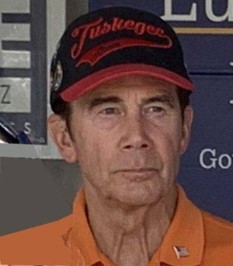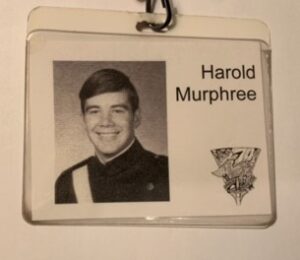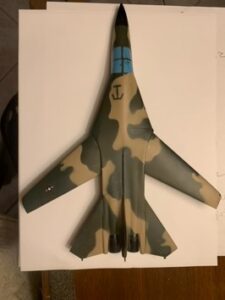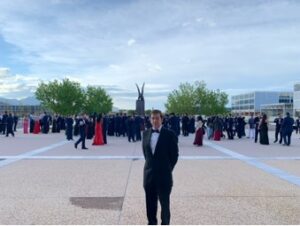by Sue Wolinsky, Family Member, Army IL National Guard
‘Mild Mannered’ Veteran in Action in East Mountain
 Harold “Spike” Murphree, LTCOL (ret), is a mild-mannered guy. You can often find him sitting in the East Mountain Democrats Office on Route 14 in rural Cedar Crest, chatting comfortably with the variety of walk-ins who stop in. He carries a low profile, although he is a Ward Chair for 22A and keeps the Bernalillo County Democratic Party alive in the east mountains, is a member of the DPNM SCC, ran for Senate District 19 (a very red district) in 2016, and serves our caucus and liberal causes in many capacities. His passion is serving veterans and military families in New Mexico and mentoring cadets at the US Air Force Academy.
Harold “Spike” Murphree, LTCOL (ret), is a mild-mannered guy. You can often find him sitting in the East Mountain Democrats Office on Route 14 in rural Cedar Crest, chatting comfortably with the variety of walk-ins who stop in. He carries a low profile, although he is a Ward Chair for 22A and keeps the Bernalillo County Democratic Party alive in the east mountains, is a member of the DPNM SCC, ran for Senate District 19 (a very red district) in 2016, and serves our caucus and liberal causes in many capacities. His passion is serving veterans and military families in New Mexico and mentoring cadets at the US Air Force Academy.
Oh, and did I mention that he had a distinguished career in the US Air Force (USAF)? He served nearly 29 years before finding his way to the East Mountains near Albuquerque in 2005. The USAF Academy graduate flew F-111s; was deployed to Desert Storm; served as a liaison to the U.S. Army; had three tours in the United Kingdom, including teaching Air Ground Operations at the Joint Warfare Staff school. He also taught Government at the USAF Academy and the University of Colorado.
EARLY LIFE: The native Texan spent much of his teen years in the Chicago area; in Hammond, IN, in fact.
Author’s Note: Spike and I realized we have much in common. We graduated high school in the Chicago area in 1969. We experienced the unrest of the assassinations of President Kennedy, his brother Robert, and Dr. Martin Luther King. We witnessed the demonstrations and brutal police action during the 1968 Democratic Convention. Then came the demonstrations and killing of students at Kent State. These events fueled our life decisions. Oh, and don’t forget our undying allegiance to the consistently performing Chicago Cubs.
Spike had role models in his family who influenced his drive to “do my part,” he said. “Dad (Harold Murphree) was a pilot in the WWII Army Air Corps and my aunt (Helen Murphree Long) was in the Navy in WWII. They both influenced me about enlisting. They did their time in the service, so I’ll do my time,” he thought. “I’d like to fly, like he did. The Vietnam War was ending, so I figured I’d serve, prevent these kinds of thing from happening again,” Spike thoughtfully explained. The events in Chicago and Kent State also influenced him to serve. “It was bad training that caused collateral damage,” he reflected as he went on to describe his USAF career as an F-111 pilot and trainer at US and international military installations.
His mom (Gwen Murphree) stoked his interest in political involvement. She was a lifelong member of the League of Women Voters. “She was trying to integrate the schools and get blacks registered to vote in Texas. The Ku Klux Klan threatened her and her family several times, but they didn’t carry through on their threats. The Voting Rights Act of 1964 was a big deal for her; she worked hard to get it passed. Dad approved of her working for the Voting Rights Act because, as dad implied in his later years when reminiscing about WWII, ‘Blacks escorted my B-17 bomb group, so they have the right to vote and live where they please.’” His mom’s activism influenced his field of study (political science) in his bachelor’s degree at Indiana University in Bloomington IN (1974, when he earned his USAF commission), and his master’s degree at the University of Pittsburgh (1975, as his first assignment in the USAF). He and Joann married in 1975 and they’ve been living in the same place at the same time in all but his wartime deployments.
Spike yearned to attend one of the military academies, but he missed the deadline on his first try. His family was moving back to Texas and his residence was in limbo between the two states. His dad encouraged him to start college and get involved in ROTC (Reserve Officers Training Corps). Then he applied in Texas and was recommended by the late Sen. Ralph Yarborough, a liberal Democrat. “He was the only senator from the old confederacy who voted for the Civil Rights Act of 1964,” Spike said, recalling his mom’s support to similarly important legislation passed.

MILITARY CAREER: Spike’s USAF career was a worldwide tour of piloting F111s; training air-ground operations teams, pilots, and USAF Academy cadets; coordinating air and ground operations during Desert Storm; and serving as liaison with the US Army.
- After earning his master’s degree, Spike attended pilot training at Williams AFB in AZ and became an instructor pilot there for three years.
- Then he had his first stint as an F111 instructor for the Royal Air Force at Upper Heyford, UK, from 1980-83; his second was in 1988-91. Later, he had a two-year exchange tour to Great Britain at the Joint Warfare Staff School with the Royal Marines Poole in Dorset. “We had students from many services and many countries,” he reflected. “We taught them how to do joint operations, to coordinate major air operations.”
- In-between he taught political science at the USAF Academy. They had asked him to go for a PhD, but the top brass said they were short of fighter pilots. “For me, flying the F111 was hard work. I had to struggle a little bit, but I succeeded,” Spike said, smiling.
- He supported NATO when he was stationed in Mons, Belgium, for a short time in 1999 to conduct air operations over Serbia.
- Spike had two wartime deployments. He flew out of Incirlik, Turkey, during Desert Storm. He was later deployed to Prince Sultan Air Base in Saudi Arabia for the war in Afghanistan, conducting air operations over Afghanistan for two years. “At HQ, we had Saudi, British, French, and American soldiers working shoulder to shoulder. Most were pilots from all the services in these countries. We all spoke the same language – fighter pilot talk – to get the job done,” he said.
- His next tour took him to Ft. Leavenworth KS, as liaison to the US Army for three years. “I liked that tour,” he said of his 2+ years explaining USAF operations to Army personnel. “We were on an Inspector General (IG) team composed of Army and USAF retired generals participating in exercises. We had a retired general from WWII. I admired and respected him greatly.”
- He taught at Air-Ground Operations Schools in Sembach, Germany, and at Nellis AFB in Nevada before retiring in 2002.

A life-long interest in race relations proved to feed his love for USAF career, his mom’s political activism, and his admiration for President Lincoln, who said, “I shall never engage in malice. What I deal with is too vast for malicious dealing.” Recalling his years at the Academy, he observed: “The USAF Academy had black cadets; their earliest entry was in the late 1960s. I entered in 1970. While there, we had training sessions about race relations put on by our black classmates. Fast forward to the murder of George Floyd at the hands of police in Minnesota. Some white graduates of the academy said ‘driving while black’ wasn’t true. Some black grads said, ‘it is true and because some whites didn’t believe it is the reason there is a problem.’”
Now, decades later, Spike is proud to note that he is seeing a more diverse USAF Academy population. He’s seeing this firsthand as part of a USAF mentoring program he participates in. “My USAF Academy class of 1974 is sponsoring the class of 2024. They thought it would be good for an old class to sponsor a new class, 40-50 years after you graduate. We build a relationship starting in their junior year, participate in their acceptance parade and their commitment dinner. I’ve met so many female cadets and many from different races, ethnic background, different countries. I’m proud to see that happening,” he said.

CIVILIAN LIFE: “After I got out, I wanted to catch my breath, cruise for a while. I knew I wanted to become involved with the Democratic Party and Democratic candidates — as my mother had done long ago. We moved to the East Mountains in 2005. By 2008 – I started to get involved. Vickie Farrar had opened a campaign office for Obama in Cedar Crest. After 2008, this group scattered. By 2010, I was full up and running. Then we regrouped to get then-Congressperson Martin Heinrich re-elected in 2010. In 2012, he ran for Senate, so our current governor ran for his Congressional seat. We got both of them elected,” he recalled. “We ran Democrats for office; we got out the ‘closet Dems’, independents, and some crossover Republicans. Our goal was not to have any Republicans run unopposed.“
“Running for office was on my bucket list. My mother had been on some campaigns, and I thought it was a good thing to do. I ran for the heavily Republican State Senate District 19 in 2016. My Republican opponent Jim White was a former USAF pilot too. We respected each other…. I lost the election 60% to 40%, but I felt we at least made a dent in a red area – a start. We talked kitchen table issues. These are important to the two kinds of libertarians out here – right wingers and the leftover hippies who are living like hermits out here,” he said.
Spike got more involved with grassroots organizing and with helping veterans and military families across the state. Many of Spike’s other activities are listed in the opening paragraph to this story. Along with his work on the Veterans and Military Families Caucus (he has served as Vice Chair at Large and is currently a CD1 Vice Chair), Spike has also been active in the DPNM Rural Caucus. “I live in a rural area and many veterans live in rural areas, so we have work to do here,” he concluded.
Thank you Spike! What a fine story. My mother was also a civil rights activist in the 50s and 60s. My father was a 25-year decorated WWII Navy veteran. Both would be considered progressive Democrats should they be alive today.